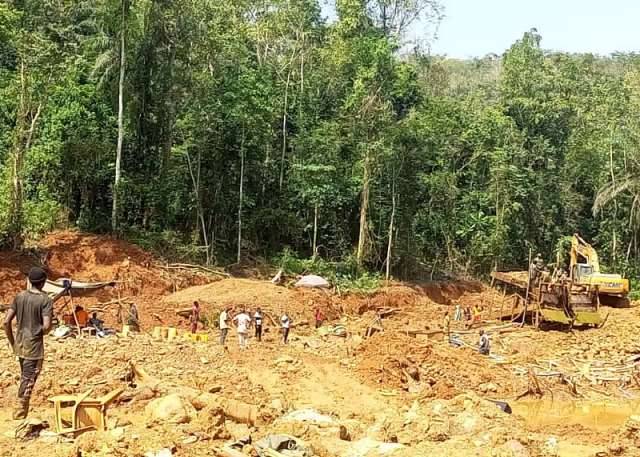In a bid to curb the menace of illegal mining, also known as galamsey, the Ghanaian government has introduced a new three-step clearance process for mining activities. This move aims to ensure that mining companies operate responsibly and adhere to environmental regulations. According to Isaac Andrew Tandoh, Deputy Chief Executive of the Minerals Commission, mining companies must now obtain three distinct permits before commencing operations.
The new regulations require mining companies to obtain an environmental permit from the Environmental Protection Agency (EPA), a water use permit from the Water Resources Commission, and an operational permit from the Minerals Commission. Tandoh emphasized that having a mining lease alone is no longer sufficient to commence operations, as some companies have been known to jump to conclusions and start mining without completing the necessary documentation.
This development follows recent anti-galamsey operations that resulted in the arrest of 51 individuals, including eight Chinese nationals, and the seizure of 30 excavators in the Tonton Forest Reserve. Over 150 excavators have been seized nationwide this year as part of the government's efforts to tackle illegal mining. Tandoh stressed that the government will not relent in its fight against galamsey, citing the need to restore Ghana's water bodies and forests.
The Minerals Commission has been working closely with security personnel to crack down on illegal mining activities. Tandoh confirmed that the Commission was fully briefed and involved in the recent raid, which was led by security personnel. He also revealed that internal investigations are underway following reports of collusion between illegal miners and some officials of the Forestry Commission.
According to Tandoh, an undercover probe uncovered evidence that some officials paid with taxpayer money are part of the syndicate. The Minerals Commission is also conducting internal checks to weed out any staff who may be complicit in the illegal mining network. Tandoh rejected suggestions that the crackdown was politically motivated, emphasizing that state institutions must do their jobs to protect Ghana's environment.
The government has received full backing from the President to enforce these measures. Tandoh called for collective national resolve, stating that if Ghanaians don't unite against galamsey, they will lose the fight. He emphasized that the fight against galamsey is for humanity, the next generation, and the land that their forefathers left them.
The updated verification system is expected to block the gaps that previously allowed mining firms to operate without completing all necessary documentation, particularly in environmentally sensitive zones such as forest reserves. The Attorney General's office has been advised to initiate legal proceedings against individuals found engaging in illegal mining, especially those operating in forest reserves.
These new measures follow other recent developments, including the reassignment of 38 police commanders in areas heavily affected by illegal mining. The government's efforts to combat galamsey demonstrate its commitment to protecting Ghana's natural resources and ensuring the long-term viability of the mining industry.
In conclusion, Ghana's new mining regulations are a step in the right direction towards combating galamsey and promoting responsible mining practices. The government's efforts to protect the environment and ensure compliance with regulations will have a positive impact on the country's natural resources and the mining industry as a whole. By working together, Ghanaians can ensure that their natural resources are protected for future generations.
The fight against galamsey requires a collective effort from all stakeholders, including government agencies, mining companies, and local communities. By implementing stricter regulations and enforcing compliance, Ghana can promote responsible mining practices and protect its natural resources. The success of these efforts will depend on the commitment of all stakeholders to work together towards a common goal.
Ghana's mining industry has the potential to contribute significantly to the country's economic development, but this must be balanced with environmental sustainability. The government's efforts to combat galamsey and promote responsible mining practices demonstrate its commitment to protecting the country's natural resources and ensuring the long-term viability of the mining industry. By working together, Ghanaians can ensure that their natural resources are protected and that the mining industry contributes to the country's economic development in a sustainable and responsible manner.


